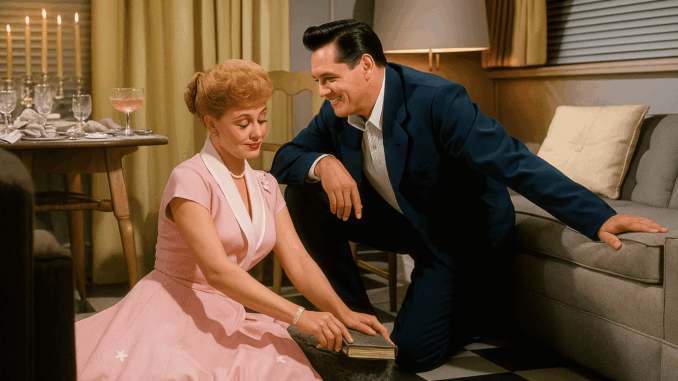
Lucille Ball and Desi Arnaz were more than just Hollywood stars—they were pioneers who reshaped television history with I Love Lucy. Their on-screen chemistry as Lucy and Ricky Ricardo became one of the most beloved pairings of all time, making them household names and cementing their legacy in entertainment. Yet behind the laughter and success, their marriage was unraveling. For Lucille Ball, there came a specific moment when she knew she could no longer hold on, a breaking point that led to the painful decision to divorce the man who had once been the great love of her life.
A Love Story That Defined an Era
Ball and Arnaz married in 1940, in what was considered a whirlwind romance. She was a rising actress, and he was a Cuban bandleader making waves in Hollywood. Their marriage faced obstacles from the start—different cultural backgrounds, conflicting work schedules, and Arnaz’s reputation as a flirt.
When they created I Love Lucy in 1951, it wasn’t just a show—it was their attempt to strengthen their marriage. Ball insisted on Arnaz playing her television husband, not only to capitalize on their real-life chemistry but also to keep him close during long workdays. For a while, it seemed to work. Together, they became the most powerful couple on television, breaking barriers and setting records.
Cracks Beneath the Surface
Despite their success, the personal struggles were mounting. Arnaz’s heavy drinking, rumored affairs, and the immense stress of running Desilu Productions put an unbearable strain on the relationship. Ball, who had fought tirelessly to build her marriage and family, increasingly felt like she was doing so alone.
Their arguments became frequent and intense. While their comedic timing on screen remained flawless, off screen the distance between them widened. By the late 1950s, Ball’s optimism had given way to exhaustion.
The Moment of Realization
The turning point came during the filming of The Lucy-Desi Comedy Hour, the follow-up to I Love Lucy. According to accounts from friends and Ball herself, it was during this period that she realized their marriage could not survive.
One story often cited is that, after yet another heated argument fueled by Arnaz’s drinking, Ball broke down and admitted to close confidants that she was finished trying. She realized that no matter how much love or history they shared, the cycle of conflict was not going to change.
That moment of clarity, painful as it was, marked the end. Ball later described it not with anger, but with sadness—an acceptance that what they had built together as husband and wife had run its course.
Divorce and Aftermath
In 1960, just as The Lucy-Desi Comedy Hour came to a close, Lucille Ball filed for divorce, citing cruelty. The divorce was finalized that year, ending a 20-year marriage. It shocked fans who had idolized the couple, but for Ball, it was a necessary step toward reclaiming peace and stability.
Notably, despite the bitterness that led to their separation, the love between them never truly disappeared. In later years, Ball and Arnaz maintained a respectful relationship, especially for the sake of their children, Lucie and Desi Jr.
A Love That Never Faded
Even after their divorce, Ball and Arnaz spoke fondly of one another. Ball would later call Arnaz the “great love” of her life, while Arnaz described their time together as the most meaningful years he ever had. Their bond was evident until the very end—Lucille Ball reportedly spoke to Arnaz on his deathbed in 1986, where their final words to each other were simply, “I love you.”
Conclusion
Lucille Ball’s decision to divorce Desi Arnaz was not born of a lack of love, but of survival. The moment she realized she could no longer endure the pain of their turbulent marriage was also the moment she chose to prioritize her well-being.
Their story remains one of Hollywood’s most complex love tales—filled with passion, creativity, heartbreak, and enduring affection. And while their marriage ended, their legacy as a couple who forever changed television continues to shine just as brightly today.
